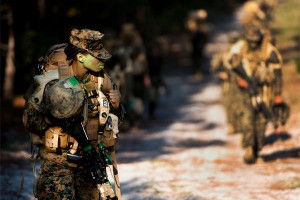
Carter: Women in Combat Could Be More Vulnerable to Sexual Predators
Allowing women to serve in ground combat positions could make them more vulnerable to sexual predators, Secretary of Defense Ash Carter told Reserve Officers’ Training Corps cadets Wednesday.
At least 18,900 service members experienced unwanted sexual contact last year, according to Defense Department estimates. As DoD takes steps to address the epidemic, the services are also studying the implications of opening ground combat positions to female service members.
In 2013, the Pentagon lifted the blanket ban on women serving in ground combat roles. By the end of this year, the services have to petition the secretary of defense if they want to keep certain military occupational specialties, such as special operations forces, open to men only.
Carter spoke to ROTC cadets at Georgetown University on Wednesday. During a question and answer session afterward, the leader of DoD was asked if opening ground combat positions to women could worsen the problem of military sexual assault.
“Obviously, as we get women into more unaccustomed positions, maybe dangerous isolated positions, maybe positions where they are fewer in relation to the number of men, it opens up opportunities for predators,” Carter said.
But gender integration could also have a positive effect, he told the cadets.
“I can’t help but believe for many people, they’ll learn better how to conduct themselves, how to interact across gender lines and so forth. And that will contribute to prevention and eventually eradication of sexual assaults,” he said, and “we get the benefit of more talented people eligible to serve in certain military roles.”
Carter said he wants to open as many positions as possible without jeopardizing military effectiveness.
He said he thought most would be opened and “maybe all will.”
Carter told the cadets that the services are looking at the practicality of integrating some of the most difficult specialties “from the point of view of reconciling traditional, at least, gender roles with combat effectiveness, unit cohesion and those kinds of things.”
Source: Stripes By: Jon Harper




